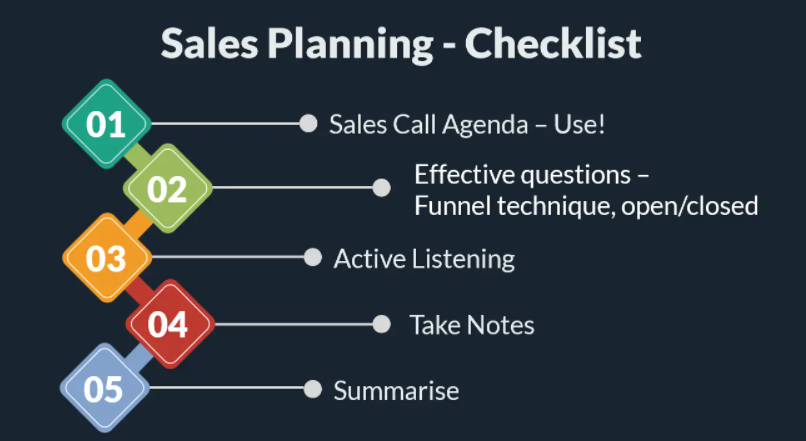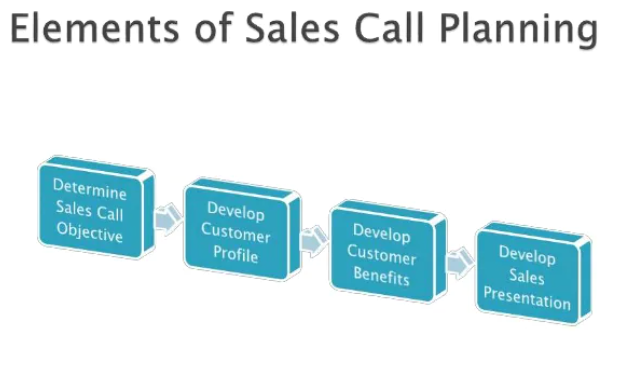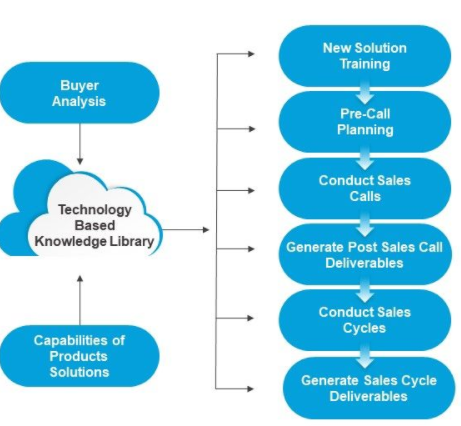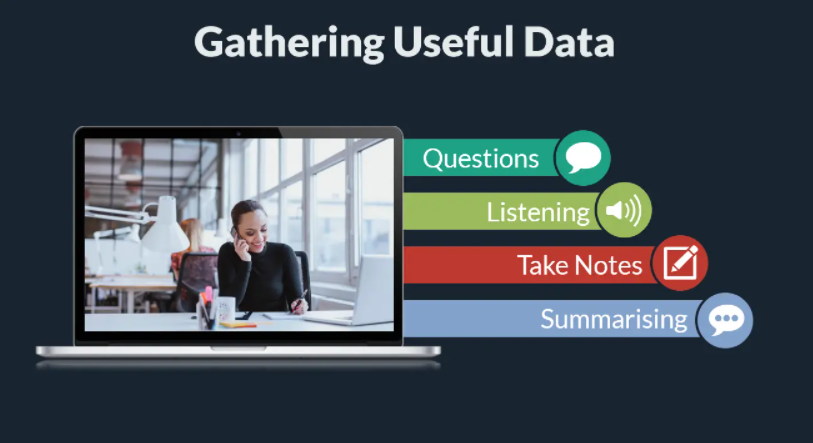Sales Call Planning is the art of creating a game plan to drive success on your sales calls. It's not too different than planning an NFL game or setting up your fantasy football roster. This will prepare you to create a fantastic experience for yourself and your customer, one that will lead to more sales.

Before you make a sales call planning, you should prepare and not field the question: What will I say?
Whether via email, on the telephone, or face to face, sales call planning is an essential part of closing leads. And no matter how much information you have at your disposal, you can't have too many tactics in your sales call planning.
This sales call planning guide contains tactics for salespeople at every experience level. Making the most out of sales calls requires planning. Whether you're reaching potential leads or existing customers, planning will allow you to go into meetings with the right mindset.
Here is an overview of the topics covered:
- Learn the 4 Questions to Sales Call Planning
- Follow a Description-Execution-Analysis process in sales call planning
- Step 1: Identify an Opportunity in sales call planning
- Step 2: Choose a Strategy for sales call planning
- Step 3: Research the Prospect in sales call planning
- Step 4: Generate Leads Using Your Research for sales call planning
- Step 5: Select Target Accounts Using Your Sales Cycle in sales call planning
- Step 6: Prepare a Presentation in sales call planning
- Step 7: Execute Your Call Plan and Close the Deal in sales call planning
- How to win sales calls by sales call planning?
Learn the 4 questions to sales call planning
Every salesperson knows the importance of having great Sales Call Planning. But do you know why you must plan so much? The reason is simple: it allows you to be prepared for anything that will come your way. How do you plan for every possible situation? You ask yourself four questions before you make any sales call planning.

Source: Sales call planning
1) What is the goal of your sales call planning? Do you want them to purchase? Or do you want them to listen to your pitch? Is your plan to get an appointment, or is it to leave them with some feeling? Once you answer this question, you can start working on how to accomplish your goal
2) Who are the decision-makers and influencers in the company? It could be anyone from marketing, operations, finance, etc. This way, you have an idea who will be coming with you during the sales call planning
3) What information do they need from you? This way, before the sales call planning starts, you already have all of the data ready. You don't have to scramble for information so that they can hear what they want
4) What objections might they have about your product or service? This way, it's prudent that you're confident that you know your buyer well before going into a sales call planning
The questions above are more than a formula. They elicit the information you need to make a correct decision using your expertise and experience to develop the best solution for sales call planning
Follow a description-execution-analysis process in sales call planning
The sales call planning process is both simple and profound. It consists of making three lists: what you will say, how you will say it, and what you will do if the prospect says no.
Why would the prospect say no to a sales call planning? Because they have a problem to solve and don't think your solution is the answer. Your job is to show that you understand the prospect's problem better than they do or can find someone who does and that your solution is not only pleasing but also uniquely good for them.

Source: Sales Call Planning
The process of sales call planning begins with a description of the target customer and their situation. Next comes a plan for executing a compelling sales call. This is followed by a careful analysis of what was learned from the customer and how it changes the salesperson's understanding of the situation. The cycle then repeats.
The description of the target customer and their situation may in sales call planning come from various sources: research, an interview with the customer, or even experience with similar customers. The description is most useful when it includes details about work situations, business focus, key personal concerns, and the like. It also helps to clarify how similar this account is to or different from the ones previously sold.
The next step in sales call planning is to translate this understanding into objectives for making the sales call successful. Objectives are statements about what you will do during the sales call to help achieve your goal.
Finally, you need to analyze your prospects' reactions to your presentation during the sales call planning to see if you are achieving your objectives. Changes in purpose should be made as necessary based on this analysis.
There are seven high-level steps to successful sales call planning:
Step 1: Identify an opportunity in sales call planning
Sales call planning is the most crucial step in the sales cycle. It is essential to identify an opportunity before planning a sales call. Therefore, the first step is to identify a possibility that you will convert into revenue.
The idea here is to find your "ideal client." You will need to identify what your ideal client looks like in the buyer personas you created earlier.
This should be reasonably simple. It means that when it comes time to do your cold call outreach, you know exactly who you are calling and why they would be interested in talking to you.
One of the most important things in sales call planning you'll do as a startup founder and salesperson is identifying an opportunity. This is one of the first steps you'll take, but it's also one of the hardest.
As a startup founder, this means that you're going to need to be able to sell yourself and your idea convincingly to investors in sales call planning. This involves far more than just putting together a slide deck; instead, it's about creating an entire narrative that paints your product as something people will want to use.
Step 2: Choose a strategy for sales call planning
It would be best if you chose the strategy that best fits your sales call planning. You can use either of two basic techniques for making sales call planning:
One-at-a-Time Strategy. With the one-at-a-time strategy, you call on each prospect individually, either in person or by telephone. This strategy is best suited to selling products or services sold to an individual, such as office equipment or consulting services. This strategy also works well for products and services that must be installed and customized for each customer, such as computers and software programs.

Source: Sales Call Planning
This strategy in sales call planning also works well when you're selling to a small number of significant prospects -- for example, when you're selling to the purchasing department of a large company or several top executives in a smaller company. You can present your case more effectively in person than over the telephone and take advantage of face-to-face contact to build trust and personalize your message.
The strategy of sales call planning is the answer to the question: Why is this customer worth your time? You can't just go in and throw numbers at them. It would be best if you had an angle, a reason to believe you can help them.
Step 3: Research the prospect in sales call planning
The goal here in sales call planning is to learn everything you can about the individual you will be talking to and their company.
The more you know before your sales call planning, the more confident and persuasive you will sound. And the more compelling your message will be.
You don't need to know everything, but there are a few things we recommend learning:
- The prospect's background, including what they studied in school and previous positions
- How many years they have been with the company, and in what capacity
- Any recent news concerning the company or its products and services
- You may also want to research the person's social media profiles for personal interests, etc.
The point of this step in sales call planning is to find facts about the prospect worth quoting. You are looking for facts you can use to get the opportunity interested in talking to you, which will make it easier for you to get the prospect interested in buying what you are selling.
When you do this, you will gather two kinds of information: current and historical data for sales call planning.
Step 4: Generate leads using your research in sales call planning
Be specific with your information in sales call planning. If you're contacting a marketing manager, tell them that you're reaching out to them because they're in charge of marketing. If you're calling a general manager, tell them that you're reaching out to them because they manage marketing at ABC company. You want to make it as easy as possible for the person on the other end of the phone to act on your sales call planning.
The first thing you need to do is prioritize your leads. Whom do you call first? Who do you call second? Whom do you call third?

Source: Sales Call Planning
Some salespeople pick names out of the blue and call them at random. If they happen to hit on someone with an urgent problem that your product is perfect for, then they just happened to get lucky and sell something. But if they hit someone who has a problem but no urgency, or someone who doesn't have a problem at all, then they've wasted time and effort and annoyed someone in a sales call planning.
We are not saying that luck doesn't play a role in sales call planning--it does--but there's no reason why we can't increase our chances by using our knowledge as best we can. You should call the people who will be most receptive first.
Step 5: Select target accounts using your sales cycle in sales call planning
If your sales cycle is monthly, you should focus on accounts that need the solution you provide within the next month or two. If your sales cycle is quarterly or annual, look for opportunities with customers who will need your answer in the next quarter or year.
The sales cycle is when it takes to get from meeting a prospect for the first time to closing on an initial sale. It's essential to plan your sales calls around the sales cycle, rather than trying to fit every sale call into the same time frame.
The challenge is that each account progresses through the sales cycle at its speed.
Getting a new customer isn't just a numbers game, where quality doesn't matter at all. It's a quality/quantity trade-off. You want to get your foot in the door with as many good clients as possible because it's easier to win repeat purchases from existing customers than it is to find new ones. But it would be best if you also focused on building an ongoing relationship with one particular client, rather than spreading yourself too thin and trying to build relationships with ten or twenty different clients.
The trick in sales call planning is figuring out how many leads you should work on at once and then deciding which ones you should pursue and which ones you should let go of.
Step 6: Prepare a presentation for sales call planning
When you're preparing to make a sales call planning, your goal is to be able to state your case in one sentence of about 15-20 words. This statement should clearly and briefly encapsulate the benefit that your product delivers.
It must be a short sales call planning. In many cases, you won't have to make a presentation at all. But if you do, it should be brief. It's a good idea to develop a presentation that you can deliver as needed, making it easy to be convincing. You don't need a flashy multimedia show or a ton of graphics. Prospects often find those annoying and distracting. They want to understand what this technology can do for them and make their lives easier.

Source: Sales Call Planning
Your goal is to get the prospect to look at the information you have prepared for him and read it either before or during the sales call planning. That's it. Make sure that your presentation contains only the highlights of the material in a way that will get a busy person to read it.
You can accomplish this by putting the key points into a bulleted list, creating a mind map that shows how these things are related to one another, or simply writing out what you will say when you get on the phone.
You must get this information in front of them before you start talking about what it means to them in sales call planning.
Step 7: Execute your call plan and close the deal in sales call planning
When you are selling, you must remain confident that what you are selling will benefit the customer. When the customer is selling, they must believe that what you are buying will significantly help you in sales call planning.
Sales call planning is a transaction in which both parts occur at the same time. The buyer wants something from the seller, but the seller needs something from the buyer. For example, if you sell insurance, your customer wants protection, but you want customers' money. For this transaction to go smoothly, both parties need to get what they want from each other. That's why it's called a transaction.
For this transaction to go smoothly, you need to think through your sales call planning process and close the deal on your terms by following a detailed plan. The sales call planning can be as simple as a list of the key points you want to make during the conversation. It might be a visual representation such as a mind map or an outline. It could involve a script for you to follow. Whatever method helps to organize your thoughts and convey your message is fine.
The sales call planning does not need to be complicated; it just needs to work for you.
How to win sales calls by planning ahead in sales call planning?
One of the most important things a salesperson can do is plan their sales calls before they begin. This helps you stay focused on the call and allows you to know what information you will need from your prospect ahead of time.
Here are some tips for sales calls planning:
- Know who you are calling and why in a sales call planning. Having a good reason for making a particular call will help keep you focused on the goal of the call. If planning a call isn't going to help you achieve your goal, you shouldn't make it at all
- Know what data or information you need from the prospect to make a good presentation for sales call planning. If there is something that would be helpful that you don't know, then go ahead and ask for it now so that you don't forget later
- Have a plan prepared before the start of the sales call planning so that you and the prospect know what topics will be discussed and in what order they will be addressed
A sales meeting is a particular case of sales call planning, so what you learned about sales call planning applies to sales meetings too
Sales meetings are critical in the following two situations:
- You have never sold anything to this company before
- The salesperson who usually does the work for this company isn't available for some reason
In either case, you will need a sales call planning to prepare for the meeting and conduct the conference itself.
Wrapping up
There is a lot to get right when you prepare for a sales call planning. You need to know what you're pitching, why it's worth buying, and how your product or service offers the best solution. You need to know the person you're meeting and their company. The above 7-step guide for sales call planning will help you get ready to answer questions and objections and demonstrate what makes you better than your competitors.
How Deskera Can Assist You?
Whether you are a sales manager or running your own business, there are tons of duties and responsibilities that you have to fulfill. Using the Deskera CRM system, you can manage your contacts, leads and sales deals. You can use the CRM system to manage all customer data and manage your leads, deals and your sales quota.
Doing so will help you to save the time taken in transferring customer data between the different systems. Having a good CRM system will help you manage your financial and sales reports and be prepared to kick-off your meetings.
Deskera can also assist you with real-time updates about your business like cash flow status, customer satisfaction, inventory management, sales, purchases, purchase orders, customer tickets, customer satisfaction, managing leads, revenues, profit, and loss statements, and balance sheets.
Moreover, it would also help in integrating sales methodology across different platforms onto one system so that you have a consolidated list for email campaigns, leads management, and sales pipeline to mention a few.
It will also help you to sync between your orders, payments, taxes, refunds, product variants, sending out invoices and reminders, facilitating invoice management, and even undertaking follow-ups and advertisement campaigns.
Such a consolidated platform will help you to improve your sales through building effective sales compensation plans and also facilitate faster and well-informed decision-making. It will help you in strengthening your opportunities and being braced for the threats.
Deskera books and Deskera CRM will also be able to ensure the highest customer satisfaction and thereby an increase in net revenues and net profits.
Key takeaways
Sales Call Planning is the first step in the sales process where you need to organize your thoughts and plan your schedule. You can't succeed in sales if you jump into every call unprepared.
With each new opportunity, you should always follow these steps:
1) Filter prospects - Do I want this deal?
2) Qualify prospects - What is the potential of this deal?
3) Preparing for Sales Call - Do my notes help me win the deal?
4) Win over prospects during sales calls - How can I engage prospects?
5) Close sales effectively - How to ask for the order?
6) Follow-up & Nurture leads - Is there anything I can do to ensure the future success of this deal?
7) Monitor performance & make improvements - How can I get better at my job?
At Deskera, we are on a mission to create an ecosystem and a platform for salespeople in sales call planning that helps bring more deals. We're here to help salespeople run their business better, save time, get more organized and be more effective.
Related Articles











